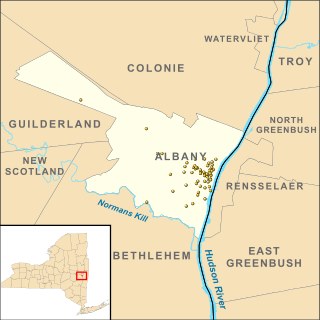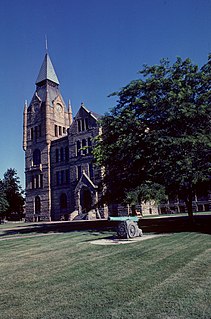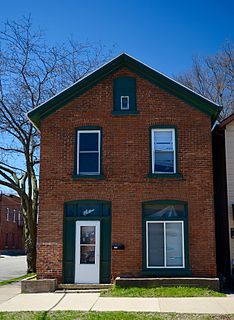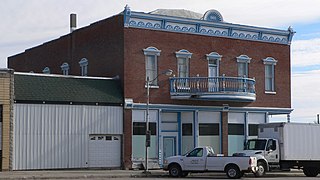
The Marshall Historic District is a National Historic Landmark District that encompasses a significant portion of the central residential and commercial area of Marshall, Michigan. The district is nationally significant for the remarkably unified and well-preserved street plan, architecture, and public infrastructure, one of the largest such concentrations in the nation. It was designated a National Historic Landmark in 1991.

Beaufort Historic District is a historic district in Beaufort, South Carolina. It was listed on the National Register of Historic Places in 1969, and was declared a National Historic Landmark in 1973.

The Pythian Opera House, also known historically as the Knights of Pythias Hall, Boothbay Harbor Opera House and The Opera House, and formally as The Opera House at Boothbay Harbor, is a historic meeting hall and multifunction building at 86 Townsend Avenue in Boothbay Harbor, Maine. Built in 1894, it has housed government offices of the town, and the meeting spaces of fraternal organizations, prior to its present use as a performance venue. It was listed on the National Register of Historic Places on December 30, 2008.

The Item Building is a historic commercial building at 26 Albion Street in Wakefield, Massachusetts. Built in 1912, the single story brick building serves as the headquarters of The Wakefield Daily Item, Wakefield's main community newspaper, and is a well-kept example of early 20th century commercial architecture.

There are 65 properties listed on the National Register of Historic Places in Albany, New York, United States. Six are additionally designated as National Historic Landmarks (NHLs), the most of any city in the state after New York City. Another 14 are historic districts, for which 20 of the listings are also contributing properties. Two properties, both buildings, that had been listed in the past but have since been demolished have been delisted; one building that is also no longer extant remains listed.

The Greenwich Avenue Historic District is a historic district representing the commercial and civic historical development of the downtown area of the town of Greenwich, Connecticut. The district was listed on the National Register of Historic Places on August 31, 1989. Included in the district is the Greenwich Municipal Center Historic District, which was listed on the National Register the year before for the classical revival style municipal buildings in the core of Downtown. Most of the commercial buildings in the district fall into three broad styles, reflecting the period in which they were built: Italianate, Georgian Revival, and Commercial style. The district is linear and runs north-south along the entire length of Greenwich Avenue, the main thoroughfare of Downtown Greenwich, between U.S. Route 1 and the New Haven Line railroad tracks.

The Lima Cleaning and Pressing Company Building is a historic structure located along South Main Street in Lima, Ohio, United States. Built in 1890, it is an example of an early style of commercial architecture.

The Isleton Chinese and Japanese Commercial Districts is located in Isleton, California in the Sacramento–San Joaquin River Delta, a large agricultural area in Sacramento County, California. Also known as the Isleton Asian American District, it served as the commercial and social center for both the town's Chinese and Japanese residents and the laborers working in nearby canneries, farms, and ranches. Isleton Asian American District is the only Asian community built in the Delta during the 1920s, and the architectural style of the buildings in the districts, particularly the use of pressed tin siding, is unique to other Delta Asian communities and to the town of Isleton.

The Main Street Historic District encompasses most of the historic central business district of Manchester, Connecticut. It runs along Main Street between Eldridge and Center Streets, including the cluster of civic and municipal buildings at Center Park. The district was largely built up between 1890 and 1940, and includes a remarkable concentration of high-quality Colonial Revival construction. The district was listed on the National Register of Historic Places in 1996.
Frederick Albert Hale was an American architect who practiced in states including Colorado, Utah, and Wyoming. According to a 1977 NRHP nomination for the Keith-O'Brien Building in Salt Lake City, "Hale worked mostly in the classical styles and seemed equally adept at Beaux-Arts Classicism, Neo-Classical Revival or Georgian Revival." He also employed Shingle and Queen Anne styles for several residential structures. A number of his works are listed on the U.S. National Register of Historic Places.

The Woodsville Opera Building is a historic commercial and performance building at 67 Central Street in Woodsville, New Hampshire, the commercial center of the town of Haverhill. Built in 1890, it is a local architectural landmark, and includes a performance venue that has been used for many local events, including high school graduations and proms. The building was listed on the National Register of Historic Places in 1980.

The Newport Downtown Historic District encompasses the 19th century heart of Newport, New Hampshire, the county seat of Sullivan County. The district includes the major commercial and civic buildings which line Main Street between Depot Street and the Sugar River. The district was listed on the National Register of Historic Places in 1985.

The Galesburg Historic District is a 496-acre (201 ha) historic district in Galesburg, Illinois. The district includes 1049 contributing buildings and contains the town's original plat as well as several older neighborhoods. The section of the district south of North Street encompasses Galesburg's historic city center and its most significant landmarks, such as the Knox County Courthouse, the Knox County Jail, the Burlington Depot, and Main Street's commercial buildings. Knox College, the school Galesburg was founded to serve, and its historic Old Main are also located in the southern half of the district. The area north of North Street is mainly residential and is dominated by Queen Anne and Classical Revival houses, including many transitional houses displaying elements of both styles.

The Norway Historic District encompasses most of the historic village center of Norway, Maine, and is reflective of the town's growth over 150 years. Although significant early-to-mid 19th century buildings survive in the village, it was significantly damaged by a major fire in 1894, resulting in the construction of a number of new brick and wood frame buildings. The district, which is 44 acres (18 ha) in size, includes 64 historically significant residential, civic, social, and commercial buildings, and was listed on the National Register of Historic Places in 1988.

The Camden Great Fire Historic District encompasses a significant portion of the central business district of the town of Camden, Maine, United States. Extending from the Camden Opera House north nearly to Atlantic Avenue, the area's buildings were almost all built in 1893, following a large fire in November 1892 that swept through the area. The district was listed on the National Register of Historic Places in 2007.

The Waterville Main Street Historic District encompasses the best-preserved portions of the historical commercial downtown area of Waterville, Maine. Developed most intensively in the late 19th and early 20th centuries, this area was the center of commerce for Waterville and the surrounding rural communities. It encompasses 25 properties on Main and Common Streets, including the Waterville Opera House and City Hall. It was listed on the National Register of Historic Places in 2012, and was slightly enlarged in 2016.

Barre City Hall and Opera House is a historic government building at 6 North Main Street in downtown Barre, Vermont. Built in 1899, it houses the city offices, and its upper floors have served for much of the time since its construction as a performing arts venue. The building was listed on the National Register of Historic Places in 1973.

Washington Residential Historic District is a nationally recognized historic district located in Dubuque, Iowa, United States. It was listed on the National Register of Historic Places in 2015. At the time of its nomination it consisted of 327 resources, which included 262 contributing buildings, 61 non-contributing buildings, and two non-contributing objects. This is one of the early residential areas of Dubuque, and was home to its German community. It also defines the "walkable city" with commercial, industrial, and institutional buildings located here. There are a number of churches in the district from various denominations. Of particular interest are St. Mary's Catholic Church (1866), St. John's Lutheran Church (1880), and St. Matthew's Lutheran Church (1908). A significant number of the buildings were constructed in brick, and the vast majority of the buildings in the district were built by 1891. Vernacular structures are commonplace here, as are various Victorian styles. Hollenfelz House (1891) and the Dubuque Casket Company building (1894) are individually listed on the National Register. The former St. Mary's Catholic Church complex forms its own historic district within this one.

The West Second Street Historic District is located along a primary commercial street in Ashland, Wisconsin, and is listed on the National Register of Historic Places. West Second Street was later renamed Main Street West.

The Schneider Opera House is a historic building in Snyder, Nebraska. It was built as a two-part commercial block building in 1900 on land formerly owned by Conrad Schneider, Snyder's founder. According to the National Register of Historic Places form, "This opera house is significant in the area of social history because it gave Snyder a neutral, nonaffiliated location for political meetings, church bazaars, community parties, high school graduation, and box socials. [...] In the days before radio, television, and sound movies, activities at the opera house were anticipated for days or weeks' ahead of time." The building has been listed on the National Register of Historic Places since September 28, 1988.























